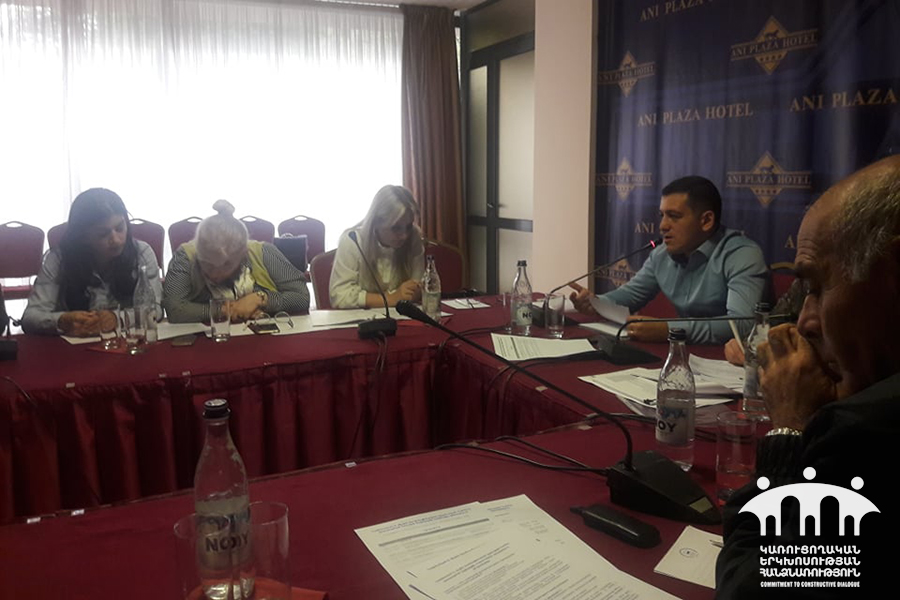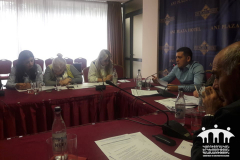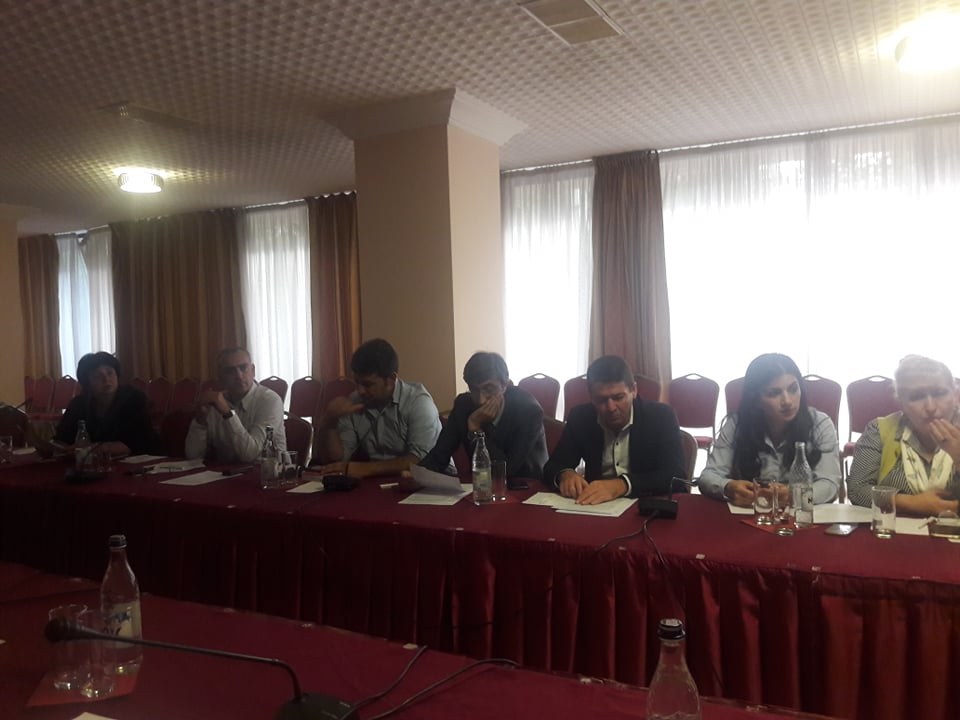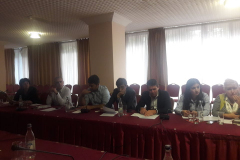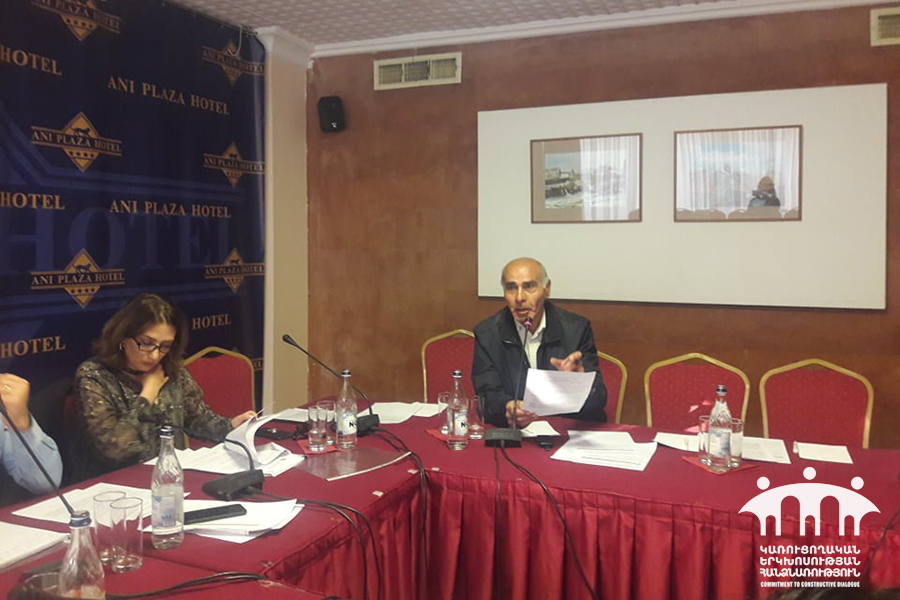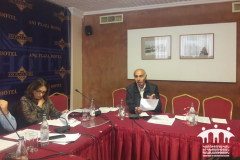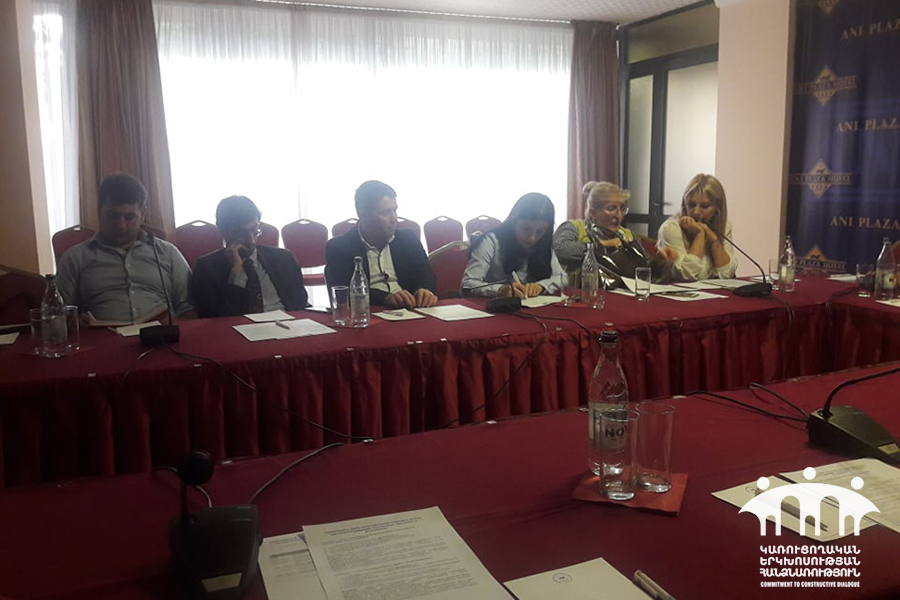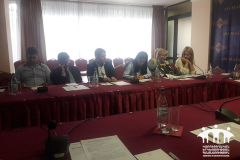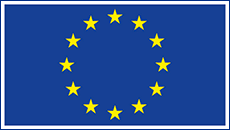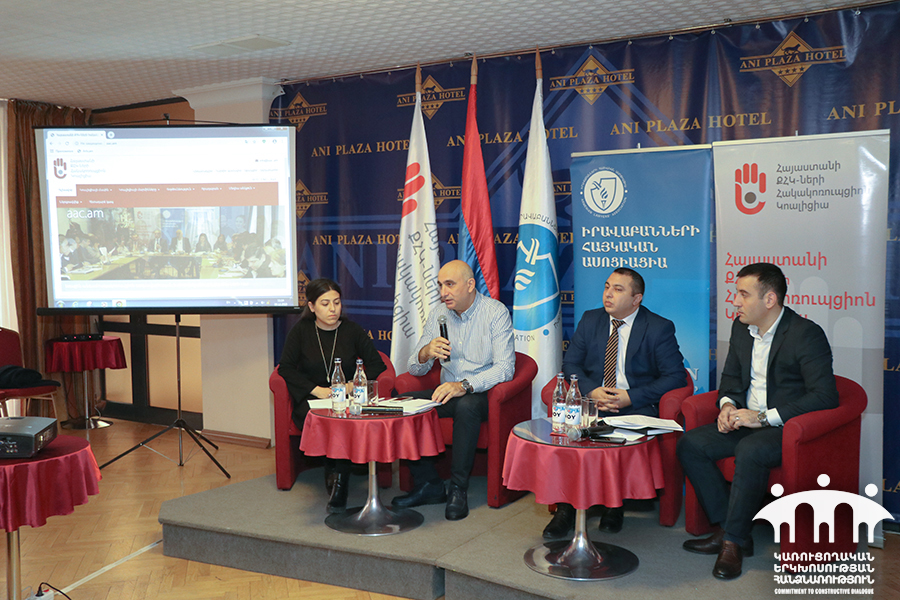
December 9 is the International Anti-Corruption Day. On December 9, the Armenian Lawyers’ Association and CSO Anti-Corruption Coalition of Armenia held a joint event dedicated to the day.
In the 21st century, the fight against corruption is being supplemented with new tools, such as the BizProect.am website that raises and reports on corruption cases and issues in the business sector in Armenia. Mr. Arkady Sahakyan, Chairman of the Governing Board of the CSOs Anti-Corruption Coalition of Armenia, said this in his speech. “It is very important that with this site we have been able to provide certain transparency in the work with our government agencies, as the site has enabled business representatives to quickly communicate and report any violations,” he said. Arkadi Sahakyan also added that being elected to the post into the coalition is a great honor and responsibility, and the role of CSOs in fighting corruption is important: “Experience shows that Armenian NGOs have so much skill and role and capability that they can even be a consultant in the international arena with great expertise.”
Mr. Karen Zadoyan, Coordinator of the Secretariat of CSO Anti-Corruption Coalition of Armenia, noted that the priority for the Coalition is to be sovereign and pro-Armenian, and that the Coalition will continue its efforts to promote a happy, harmonious and corruption-free society in Armenia. “We have now launched a coalition modernization program, as we believe in the logic of the changes taking place in Armenia in spring 2018, that we each, in turn must carry out this transformation and modernization, as a result of which we have undertaken a stronger monitoring of anti-corruption reforms in our country and functions of the main actor of evaluation,” he said. According to Karen Zadoyan, the development of the capacities of the member organizations of the coalition currently is also important: the monitoring and evaluation skills and knowledge, the expertise of the coalition which does not yield, and in some places it goes beyond the state institutions as well as its international relations.
Mr. Artyom Mesropyan, Coordinator of CSO Development Programs of the Armenian Lawyers’ Association, presented the activity report of the CSO Anti-Corruption Coalition of Armenia for the period of 19.12.2018-09.12.2019, and the successes recorded.
“On 3 October, 2019, the government adopted the Anti-Corruption Strategy Program 2019-2022, with over 80% of its action plan being coalition’s proposal,” he said. Artyom Mesropyan also spoke about the Corruption Prevention Committee, noting: “The main disadvantage of the establishment of the Corruption Prevention Committee is that the Competition Board had not been formed. In 2017, when the Law on the Prevention of Corruption was adopted, the Competition Board was reflected in it, and it was removed this year through a draft presented by Mr. Ararat Mirzoyan, President of the National Assembly. Further the Coalition repeatedly made suggestions to both international structures and relevant state bodies that this was not in line with the Jakarta Principles, since it stated that the process had to be apolitical and that the direct appointment process itself did not imply an apolitical approach. Despite the fact that the first composition was formed through direct formation, the Ministry of Justice has currently circulated and the Government has already approved and submitted the National Assembly new amendments to “Law o Corruption Prevention Committee” which provide for the re-establishment of the Competition Board.
It should be noted that the alumni of the 2019 stream of the Anti-Corruption School for Young Leaders presented their graduation papers. It should be noted that all 10 works were related to anti-corruption topics.
The graduation work of the student Eduard Hovhannisyan was related to the model of anti-corruption bodies. He talked about differentiated and multifunctional functions models, Jakarta Principles, the successful examples of fight against corruption and etc.
Hasmik Mikayelyan, the student of the school, also presented her graduation work, speaking about the whistleblowing system and the existing problems in the Republic of Armenia. She also presented international best practices in the formation of whistleblowing system.
Ani Sargsyan spoke about the importance and possible methods of anti-corruption education in the fight against corruption and the ways for their implementation. “During the six months of learning, the confidence that that the best weapon to fight against the evil is EDUCATION became stronger. And this was the reason that I decided that the topic of ‘fight against corruption’ will be my graduation work” she said.
Davit Serobyan’s theme was “Integrity in the Fight against Corruption in Local Governments”. He noted that the methodology of the work for the fight against corruption in the local self-government bodies includes several steps: conducting negotiations and signing a Memorandum of Understanding with the Mayor, forming a coalition which will coordinate through the participatory processes the identification of corruption, identify vulnerability of corruption, and general diagnosis. It would be possible through this phase, to understand the corruption risks inherent in the local self-government of the Republic of Armenia, taking into account the peculiarities of our local self-government system, in-depth diagnosis: methods used include anonymous questionnaires, interviews, focus groups and/or surveys, capacity building through training, development of solutions; Development of a final action plan.
Yevgenya Hambardzumyan’s theme was on introduction of institutes of criminal prosecution of legal entities in Armenia and introduction of anti-corruption compliance programs in the private sphere. She spoke about three main models of legal responsibility of legal entities, Armenia’s international commitments in the fight against corruption and the steps taken by the business sector.
Ani Galstyan also touched the whistleblowing system, its importance and developing tendencies. She spoke both about the bylaws, as well as the measures of responsibility provided by the Criminal Code and the Code of Administrative Offenses.
Mariam Zakaryan, a graduate of the Anti-Corruption School for Young Leaders, addressed the topic of the possibility of returning the stolen assets from Armenia. She noted that the Draft Law “On Confiscation of Property of Illicit Origin” has been presented for public discussion, which envisages application of the IN REM principle in Armenia.
The topic of Kristine Tatosyan’s presentation was about the manifestations of corruption policy in the RA educational-university system and possible ways for overcoming them. According to the survey among the student, corruption is manifested in coming to agreement related to the missed hours (absents), in coming to agreement between the student and the lecturer related to the marks, and mediation through nepotism, friends and, relatives and other actions.
Flora Mirzakhanyan touched upon the anti-corruption policy and challenges in Armenia in the light of international experience. A study was carried out within the framework of the Government of Armenia 2017 and 2019 programs. She also touched upon the measures to tackle corruption in Armenia.
Diana Aleksanyan’s final research work was Anti- Corruption Policy and Challenges in the Republic of Armenia. According to her, the challenges are: the issue of transparency of property and income of public servants, the main issues existing in the public administration system and the issue of transparency of economic activities. In addition, the effectiveness of the fight against corruption needs to be guaranteed by the application of the principle of mutual restraint and counterbalance, the reduction of the possibility of applying a dual approach to legislation, and the introduction of new tools.
After the presentations, Karen Zadoyan and Arkadi Sahakyan awarded graduates of the Young Leaders’ School with diplomas and encouraging awards in the form of books.
On the same day, the election of Governing Board of the CSOs Anti-Corruption Coalition of Armenia was held.
Karen Zadoyan, Coordinator of the Secretariat of the CSO Anti-Corruption Coalition, said that self-nomination applications have been received from the following organizations to be elected as a member of the Governing Board:
- “Support for Equal Opportunities Foundation”,
- “NGO Center” Civil Society Development NGO,
- “Union of Communities of Armenia”,
- “Right and Freedom Center” NGO
- “Center of Economic Rights” NGO,
- “Armenian Association of Young Doctors” NGO
- “Union of Advanced Technology Enterprises”,
- “Araza” Benevolent NGO,
- “Sevan Regional Development and Research Center”,
- “Tukhmanuk Human Rights and Education Center” NGO.
According to the regulations coalition, the Armenian Lawyers’ Association, which is the Secretariat of CSO Anti-Corruption Coalition is automatically incorporated as a member of the Governing Board represented by the President of ALA Mr. Karen Zadoyan, resulting in a total of 11 members.
The issue of approving the number of coalition Governing Board was also discussed. President of the “Center of Economic Rights” NGO Mr. Movses Aristakesyan suggested reducing the number of board members which currently is 13, as many were absent from the sessions. He proposed to keep the 11-member staff, and responsible and conscientious members were involved in the coalition’s work. Mr. Gevorg Grigoryan, President of the “Armenian Association of Young Doctors” NGO, said that the board should have a maximum of 7 members. Ms Tamara Abrahamyan, President of “Araza” NGO, also held a speech and withdrew her appeal, after which Gevorg Grigoryan withdrew his proposal. Later, Mr. Ashot Melkonyan, representing “Sevan Regional Development and Research Center” withdrew his appeal as well, and asked to be included in the expert committee of the coalition.
As a result, the CSO Anti-Corruption Coalition Governing Board was composed of 9 members.
- “Armenian Lawyers’ Association”, represented by Mr. Karen Zadoyan,
- “Union of Advanced Technology Enterprises”, represented by Mr. Arkadi Sahakyan,
- “NGO Center” Civil Society Development NGO, represented by Ms Arpine Hakobyan,
- “Armenian Association of Young Doctors”, represented by Mr. Gevorg Grigoryan,
- “Right and Freedom Center” represented by Ms Sona Harutyunyan,
- “Center for Economic Rights” represented by Mr. Movses Aritsakesyan,
- “Tukhmanuk Human Rights and Education Center” represented by Ms Mary Chakhoyan,
- “Union of Communities of Armenia” represented by Mr. Emin Yeritsyan,
- “Support for Equal Opportunities Foundation” represented by Mr. Hayk Margaryan.
It should also be noted that 4 CSOs of the current 9 members of the Governing Board of the Anti-Corruption Coalition were elected for the first time as members of the Governing Board. They are: “NGO Center” Civil Society Development NGO, “Right and Freedom Center” NGO, “Tukhmanuk Human Rights and Education Center” NGO, “Support for Equal Opportunities Foundation”. 6 of the members of the members of the Governing Board of CSO Anti-Corruption Coalition are men and 3 are women.
It should also be informed that the official website of the CSO Anti-Corruption Coalition (aac.am) has been launched on 9 December.
______________________________________________________________________
The Civil Society Organizations Anti-Corruption Coalition of Armenia was founded on 28 November, 2014. Currently, about 70 CSOs are members of the anti-corruption coalition.
The mission of the Anti-Corruption Coalition is to promote the eradication of corruption in Armenia by creating based on the personal example, the demand for good governance among the public at large and public servants, by introducing anti-corruption strategies in public and private institutions.


